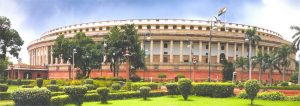
Source: https://parliamentofindia.nic.in/(Image only for representational purpose)
Amid the coronavirus pandemic and countrywide lockdown, the Ministry of Social Justice and Empowerment had asked for comments from all stakeholders on the Draft Transgender Persons (Protection of Rights) Rules 2020 on April 18, 2020. Initially, the deadline to submit the comments was April 30, 2020. It meant that only 12 days were given to file the comments – which violated the Pre-Legislative Consultative Policy (PLCP hereafter) 2014. A range of civil society activists working in the fields of transgender persons’ rights cried foul and this appeared to have an effect. On April 30, 2020, the government extended the deadline till May 18th, 2020 which exactly met the PLCP guidelines.
Citizens’ participation in the legislative process among other things strengthens the legitimacy and credibility of the legislative action and facilitates accountability. The PLCP was formulated in 2014 as on the recommendations of the National Commission to Review the Working of the Constitution (NCRWC) and NAC. It prescribes that departments/ministries should place the draft legislations in the public domain with a justification for its enactment, details of the social, financial costs, benefits, challenges, and estimated impact assessment along with an explanatory note on key legal provisions. This information must be available to the public for a minimum of 30 days.
However, it appears that this policy has been violated on multiple occasions. According to data in “Democratising Law-making: The Tale of PLCP”, 89% of bills introduced in parliament from June 2014 to May 2019 were marked by no or incomplete consultation and secrecy. A recent India Spend, investigation suggests that the government did not publish the Draft Coastal Zone Law 2019 and ignored 90% of the objections raised by the fishing community and environmental groups. It also appears that the government of India does not adequately maintain systematic records of the public consultation process. Countries like the United Kingdom, Canada, and Switzerland have proper institutionalized procedures for pre-legislative consultation.
For India to transform into a deeply participatory democracy, pre-legislative consultations need to be made compulsory that must be backed up by relevant institutional and statutory frameworks. There is a evidence, a diligent and fair consultation process leads to positive outcomes. Examples of these include the Right to Information Act 2005, Kerala Police Legislation 2011, and the Lok pal Bill 2011.
This blog is authored by Ritambhara Singh.

